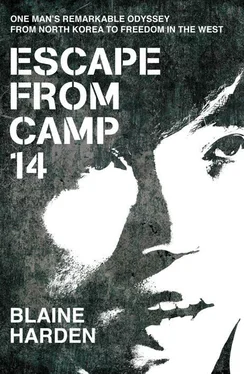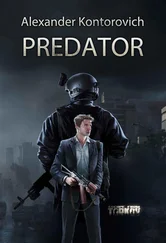In grade school Shin was taught to stand up straight, bow to his teachers and never look them in the eye. At the start of school, he was given a black uniform: pants, shirt, an undershirt and a pair of shoes. They were replaced every two years, although they began to fall apart within a month or two.
Soap was sometimes distributed to students as a special reward for hard work. Shin did not distinguish himself with diligence and rarely touched soap. His pants were cardboard stiff from dirt and sweat. If he scraped his skin with a fingernail, grime flaked off. When it was too cold to bathe in the river or stand outside in the rain, Shin, his mother and classmates smelled like farm animals. Nearly everyone’s kneecaps turned black in winter from the dirt. Shin’s mother sewed him underwear and socks out of rags. After her death, he wore no underwear and struggled to find rags to wear inside his shoes.
School — a cluster of buildings readily viewed on satellite photographs — was about a seven-minute walk from Shin’s house. The windows were made of glass, not vinyl. That was the only frill. Like his mother’s house, Shin’s classroom was made of concrete. The teacher stood at a podium in front of a single blackboard. Boys and girls sat separately on either side of a centre aisle. Portraits of Kim Il Sung and Kim Jong Il — the centrepieces of every classroom in North Korea — were nowhere to be found.
Instead, the school taught rudimentary literacy and numeracy, drilled children in camp rules and constantly reminded them of their iniquitous blood. Primary school students attended class six days a week. Secondary students attended seven days, with one day off a month.
‘You have to wash away the sins of your mothers and fathers, so work hard!’ the headmaster told them at assemblies.
The school day began promptly at eight with a session called chonghwa . It means total harmony, but it was an occasion for the teacher to criticize students for what they had done wrong the previous day. Attendance was checked twice daily. No matter how sick a student might be, absences were not allowed. Shin occasionally helped his classmates carry an ailing student to school. But he was rarely sick, other than with colds. He was inoculated just once, for smallpox.
Shin learned how to read and write the Korean alphabet, doing exercises on coarse paper made in the camp from corn husks. Each term, he was given one notebook with twenty-five pages. For a pencil, he often used a sharpened shaft of charred wood. He did not know of the existence of erasers. There were no reading exercises, as the teacher had the only book. For writing exercises, students were instructed to explain how they had failed to work hard and follow rules.
Shin learned to add and subtract, but not to multiply and divide. To this day, when he needs to multiply, he adds a column of numbers.
Physical education meant running around outside and playing on iron bars in the schoolyard. Sometimes students would go down to the river and gather snails for their teacher. There were no ball games. Shin saw a soccer ball for the first time when he was twenty-three, after fleeing to China.
The school’s long-term goals for students were implicit in what the teachers didn’t bother to teach. They told Shin that North Korea was an independent state and noted the existence of cars and trains. (This wasn’t much of a revelation, since Shin had seen guards drive cars and there was a train station in the southwest corner of the camp.) But teachers said nothing about North Korea’s geography, its neighbours, its history or its leaders. Shin had only a vague notion of who the Great Leader and the Dear Leader were.
Questions were not allowed in school. They angered teachers and triggered beatings. Teachers talked; students listened. By repetition in class, Shin mastered the alphabet and basic grammar. He learned how to pronounce words, but frequently had no idea what they meant. His teacher made him afraid, on an instinctive level, of trying to seek out new information.
Shin never came into contact with a classmate who had been born outside the camp. As far as he could tell, the school was reserved for children like him: the camp-bred spawn of reward marriages. He was told that children born elsewhere and brought into the camp with their parents were denied schooling and confined to the camp’s most remote sections, Valleys 4 and 5.
His teachers, as a result, could shape the minds and values of their students without contradiction from children who might know something of what existed beyond the fence.
There was no secret about what was in store for Shin and his classmates. Primary and secondary school trained them for hard labour. In the winter, children cleared snow, chopped down trees and shovelled coal for heating the school. The entire student body (about a thousand students) was mobilized to clean privies in the Bowiwon village where the guards lived, some of them with their wives and children. Shin and his classmates went from house to house chipping out frozen faeces with hoes and dumping the waste with their bare hands (there were no gloves for camp prisoners) on A-frame racks. They then dragged the excrement to the surrounding fields or carried it on their backs.
On warmer, happier days, after school ended in the afternoon, Shin’s class would sometimes march into the hills and mountains behind the school to collect food and herbs for their guards. Although it was against the rules, they often stuffed bracken, osmunda and other ferns inside their uniforms and brought them home to their mothers to make side dishes. They picked agaric mushrooms in April and pine mushrooms in October. On these long afternoon walks the children were allowed to talk to each other. Strict segregation between the sexes was relaxed as boys and girls worked, giggled and played alongside one another.
Shin began first grade with two other children from his village — a boy called Hong Sung Jo and a girl called Moon Sung Sim. They walked to school together for five years and sat in the same classroom. Then in secondary school, they spent another five years in each other’s company.
Shin viewed Hong Sung Jo as his closest companion. They played jacks between classes at school and their mothers worked at the same farm. Neither boy, though, ever invited the other to his house to play. Trust among friends was poisoned by constant competition for food and the pressure to snitch. Trying to win extra food rations, children told teachers and guards what their neighbours were eating, wearing and saying.
Collective punishment at school also turned classmates against each other. Shin’s class was often given a daily quota of trees to plant or acorns to gather. If they failed to meet expectations, everyone in the class was penalized. Teachers would order Shin’s class to give up its lunch ration (for a day or sometimes a week) to another class that had filled its quota. In work details, Shin was usually slow, often last.
As Shin and his classmates grew older, their work details, called ‘rallies of endeavour’, grew longer and more difficult. During ‘weeding combat’, which occurred between June and August, primary school students worked from four in the morning until dusk pulling weeds in corn, bean and sorghum fields.
When Shin and his classmates entered secondary school, they were barely literate. But by then classroom instruction had come to an end. Teachers became foremen. Secondary school was a staging ground for work details in mines, fields and forests. At the end of the day, it was a gathering place for long sessions of self-criticism.
Shin entered his first coal mine at the age of ten. He and five of his classmates (three boys and three girls, including his neighbour Moon Sung Sim) walked down a steep shaft to the face of the mine. Their job was to load coal into two-ton ore cars and push them uphill on a narrow rail track to a staging area. To meet their daily quota, they had to get four cars up the hill.
Читать дальше












